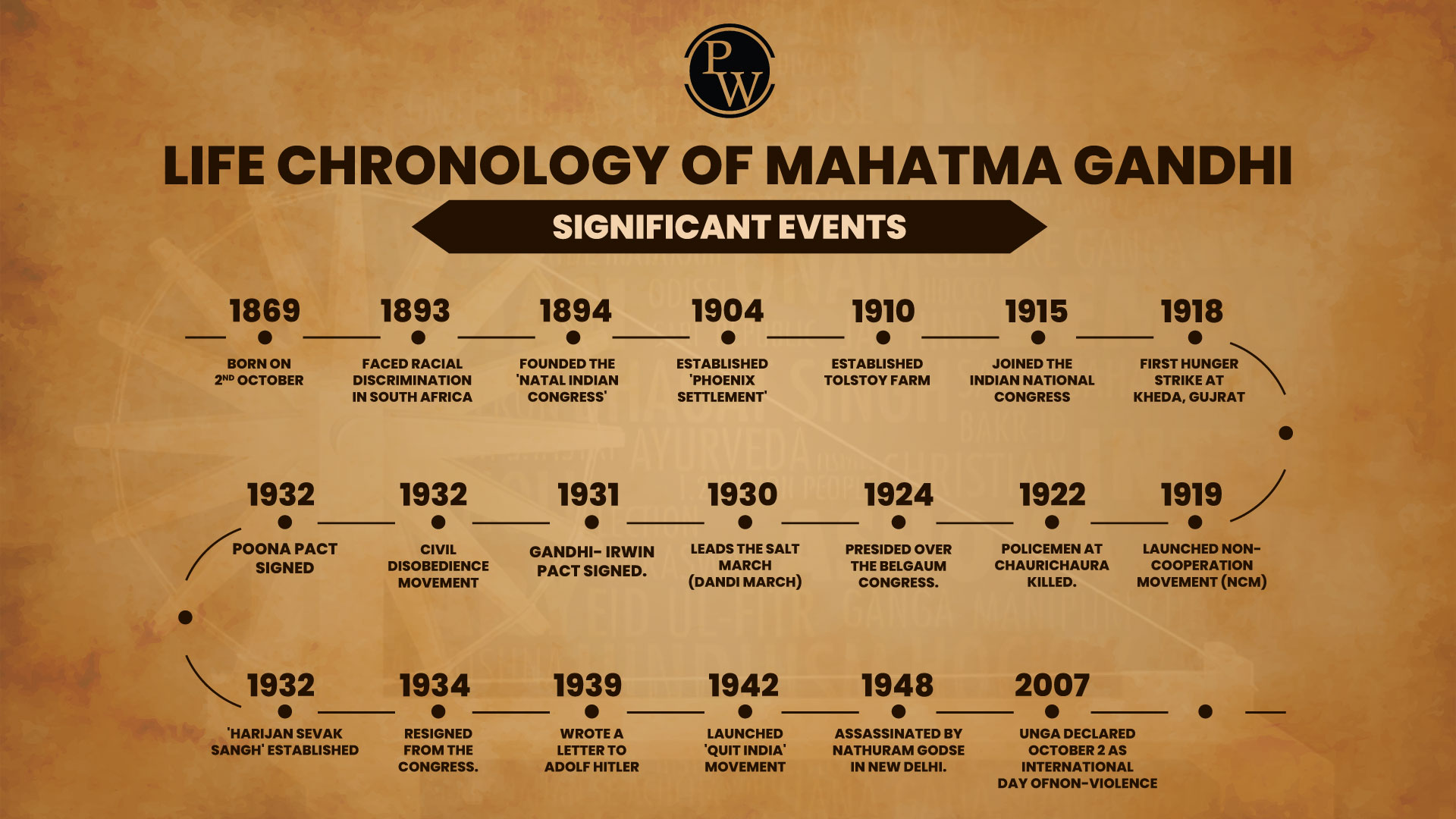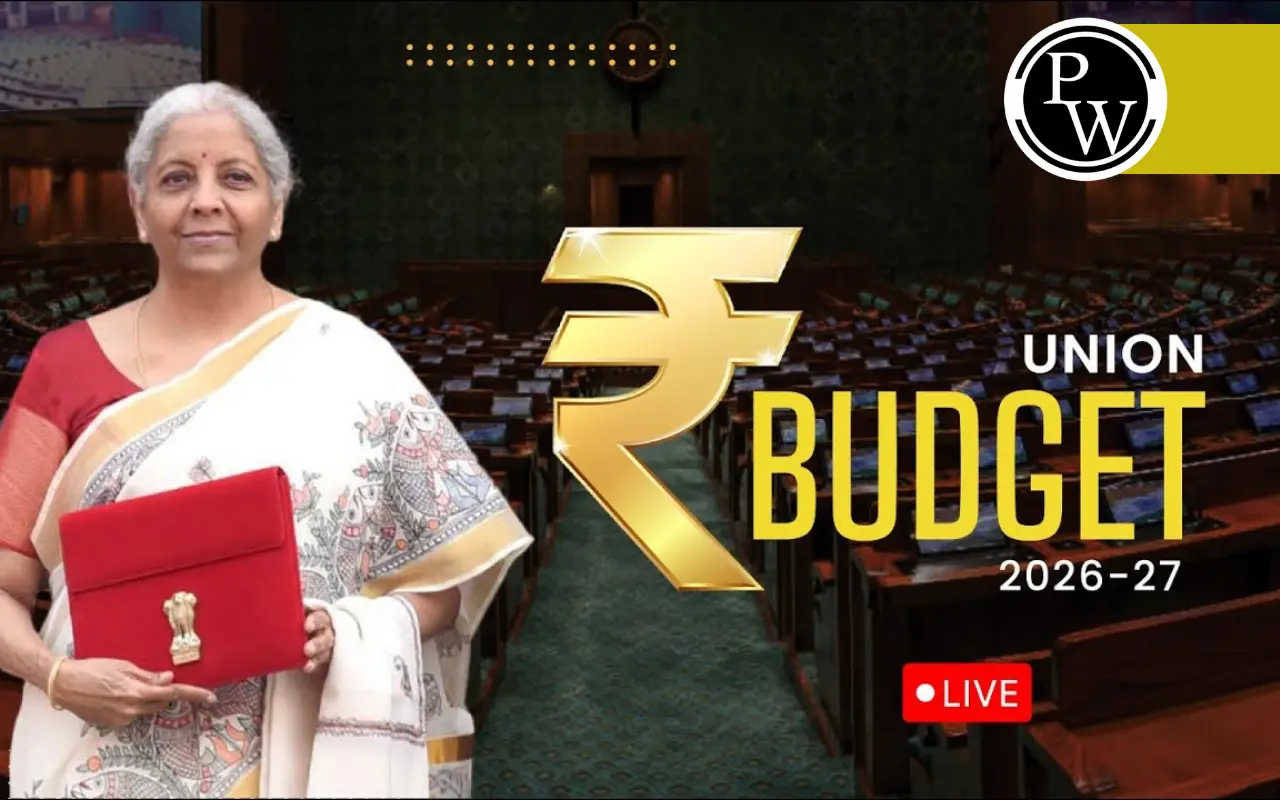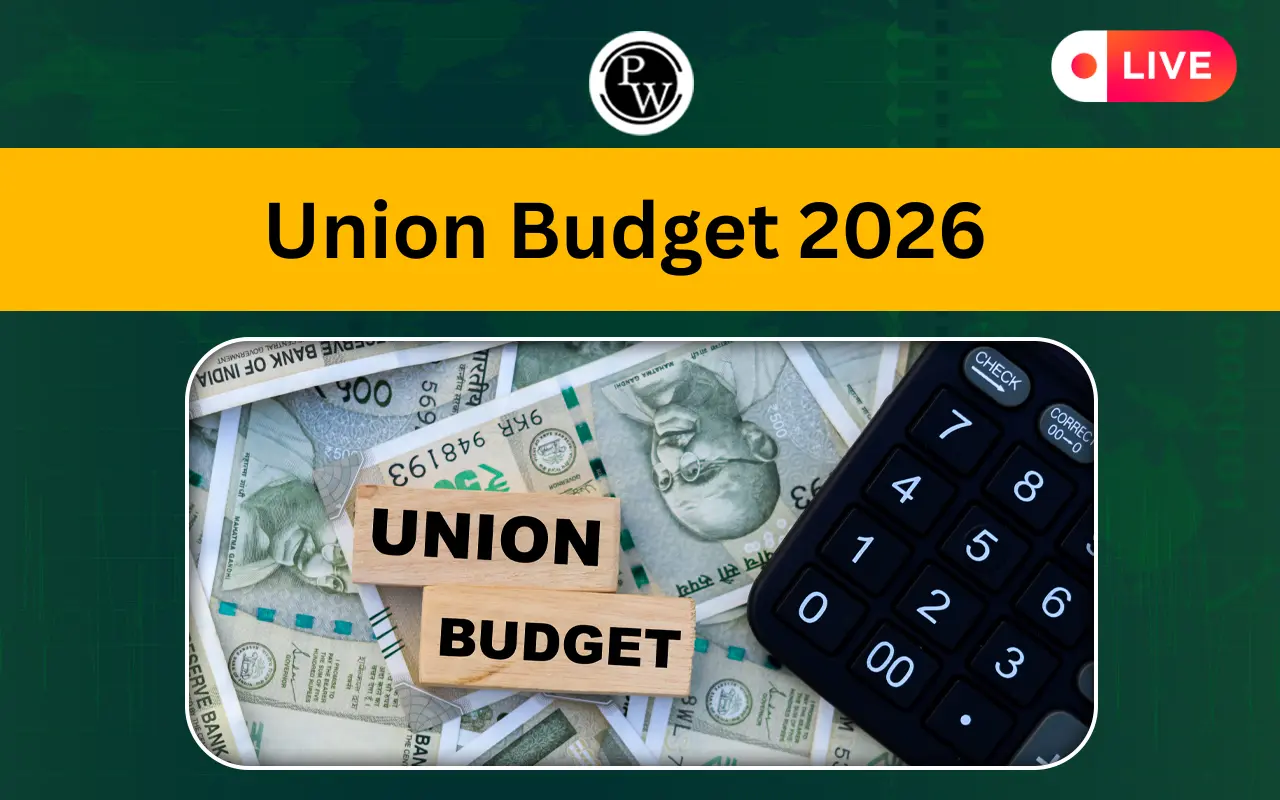
Gandhi Jayanti is celebrated annually on October 2 to commemorate the birth of Mohandas Karamchand Gandhi. He was popularly known as Mahatma Gandhi or the Father of the Nation. Gandhi Jayanti 2025 will mark his 156th birth anniversary, a special occasion not just for India but globally. The day celebrates the life and legacy of Mahatma Gandhi, particularly his principles of non-violence, truth, and social justice.
For UPSC aspirants, Gandhi Jayanti 2025, Mahatma Gandhi’s life and ideologies hold great significance as they are deeply woven into the history of India’s freedom struggle and the shaping of modern India.
Gandhi Jayanti 2025
Gandhi Jayanti 2025 is a day of great respect for Indians. People across the globe remember his valuable lessons. This day is celebrated in schools and offices all over India by holding special events. People sing his favourite devotional song, "Raghupati Raghava Rajaram." The main ceremony happens at Raj Ghat in New Delhi. This is the place where he was laid to rest. Many important leaders and citizens gather there to pay their respects.
This commemoration is a national holiday in India. It is a day of national importance. Mahatma Gandhi's Birth Anniversary 2025 is also recognised by the United Nations and celebrated as the International Day of Non-Violence, highlighting Gandhi's global influence.
Biography of Mahatma Gandhi
Mahatma Gandhi transformed from a barrister in London to the most prominent face of India’s non-violent resistance against the oppressive colonial rule. His simple living and high thinking made him a global icon. He was much more than just a politician. He was a social reformer and a moral guide. People fondly gave him the title of 'Mahatma'. This word means 'Great Soul'. On the occasion of Gandhi Jayanti 2025, everyone must know about the biography of Mahatma Gandhi, which is summarised in the table below:
| Biography of Mahatma Gandhi | |
| Particulars | Details |
| Full Name | Mohandas Karamchand Gandhi |
| Birth | October 2, 1869, Porbandar, Gujarat, India |
| Parents | Father: Karamchand Gandhi Mother: Putlibai. |
| Spouse | Kasturbabai |
| Education | University College London, Alfred High School |
| President of INC | Belgaum Session (1924) |
| Major Movements | Champaran Satyagraha, Kheda Satyagraha, Salt March, Quit India Movement |
| Death | January 30, 1948 |
| Eepitaphs | ‘Hey Ram’ |
| Posthumous Recognition | Commemorated globally, October 2 is observed as International Day of Non-Violence. |
Mahatma Gandhi’s Early Life and Education
Gandhi Jayanti 2025 will be observed to celebrate the life of Mahatma Gandhi. Mohandas was born in a coastal town called Porbandar in Gujarat, India. His family was from the Hindu Modh Baniya community.
-
His father's name was Karamchand Gandhi. He served as the Diwan, or Chief Minister, of Porbandar. This was an important government position.
-
His mother was named Putlibai. She was a very religious lady. Her strong faith and strict religious practices greatly influenced young Mohandas. He learned the value of prayer and spirituality from her.
-
Mohandas was married to Kasturbai in 1882. He was only thirteen years old at that time. She remained his faithful companion and partner throughout his long life and important struggles.
-
He received his early education in India. However, he had a bigger dream. In 1888, he decided to travel to England. He went there to study law. He joined a law college in London called the Inner Temple.
Gandhi’s Time in London
As we celebrate Gandhi Jayanti 2025, it is important to understand about Gandhi’s time in London. Moving to London was a big change for young Mohandas. He was initially very uncomfortable with the Western style of life. He felt shy and struggled to adapt to the new customs. Slowly, he began to get used to the city and its environment.
His time in England was very important for his mind. He read the writings of many famous thinkers. Two of these writers had a massive impact on him:
-
Leo Tolstoy: Tolstoy wrote about the idea of non-violence.
-
John Ruskin: Ruskin wrote a book called "Unto This Last." This book taught him about Sarvodaya. Sarvodaya means the welfare and upliftment of all people. It means ensuring good things for everyone, not just a few.
These readings shaped his personal views deeply. They became the bedrock of his unique method of fighting for justice. He realised that truth and simple living were more powerful than wealth and might.
Gandhi’s Time in South Africa
After he completed his legal studies, Mohandas went to South Africa in 1893. He went there to handle a legal case for an Indian businessperson. This move was one of the biggest turning points of his whole life and also became a reason why we celebrate Gandhi Jayanti 2025:
-
In South Africa, he saw something shocking. He experienced racism firsthand. Racism is the unfair and cruel treatment of people because of the colour of their skin.
-
A famous incident happened on a train. He had a valid first-class ticket. Yet, he was thrown off the train at a place called Pietermaritzburg. The reason? He was Indian, not white. This moment of deep insult filled him with a strong desire to fight against injustice. This single event turned the young lawyer into a political activist.
-
He chose to stay in South Africa for over twenty years. During this time, he fought for the rights of the Indian people living there. They were facing terrible laws and harsh working conditions. This is where he fully developed his technique of Satyagraha.
Satyagraha: It is a unique way of peaceful protest. It means refusing to obey unfair laws, but doing so without using any violence or hatred. It is about insisting on the truth.
Organisations: To unite the people, he started the Natal Indian Congress in 1894. He also started a newspaper called Indian Opinion. He later created a special community living area called the Phoenix Settlement. -
South Africa was like a training ground. He tested his non-violent methods there. These methods were later used to challenge the powerful British rule in India. His success in South Africa proved that non-violence was indeed a strong and effective tool.
Return to India
In 1915, Mahatma Gandhi finally came back to his motherland. He was now an experienced and well-known leader. He quickly joined India's fight for freedom. He understood that he must first understand the problems of the common Indian person. He started travelling across the entire country.
He focused on helping the poorest people. He highlighted injustices like very high taxes and unfair British laws. His leadership brought millions of common people into the freedom movement for the first time.
His efforts weakened the British control. They increased the public’s demand for complete independence. The collective work of all Indians, led by Gandhi, finally resulted in India gaining freedom in 1947. Here are some of the major movements he led in India:
| Key Events Related to Mahatma Gandhi | ||
| Key Event | Year | Impact |
| Champaran Satyagraha | 1917 | This was his first major victory in India. He helped farmers who were forced to grow indigo. |
| Kheda Satyagraha | 1918 | He helped farmers get tax relief from the British government during a terrible crop failure. |
| Ahmedabad Mill Strike | 1918 | He fought for the rights and better pay for factory workers. |
| Rowlatt Satyagraha | 1919 | Protests against repressive laws led to widespread unrest and the Jallianwala Bagh massacre. |
| Non-Cooperation Movement | 1920-22 | This movement asked people to stop cooperating with the British government. It was a massive wave of national feeling. |
| Round Table Conference | 1930-32 | Provided a platform for Indian leaders to discuss constitutional reforms, though it ultimately failed to yield significant change. |
| Salt March | 1930 | He walked a long distance to the sea to protest the unfair British tax on salt. This simple act sparked nationwide civil disobedience. |
| Civil Disobedience Movement | 1930-1934 | This was a crucial stage of mass resistance. Millions of people protested peacefully against British laws. |
| Quit India Movement | 1942 | This was the last big push for independence. Gandhi gave the powerful slogan "Do or Die". The people were asked to do their best to secure freedom. |
Final Years and Legacy of Gandhi
Even as India won freedom, the final years of Gandhi were very sad. The country was divided into India and Pakistan. This division led to huge violence between Hindus and Muslims. Gandhi was heartbroken by this communal violence. He travelled constantly to promote peace and love among the people.
-
Sadly, on January 30, 1948, Mahatma Gandhi was killed by Nathuram Godse. His death caused deep sorrow all over India and the entire world.
-
Yet, his ideas did not die. On the occasion of Gandhi Jayanti 2025, the Legacy of Mahatma Gandhi continue to inspire humanity. His principles of fighting for civil rights have been adopted globally. Great leaders in other countries took inspiration from him:
Martin Luther King Jr.: He used Gandhi’s non-violence to fight for the rights of Black people in America.
Nelson Mandela: He used Gandhi’s resistance ideas to fight against apartheid in South Africa.
-
Gandhi’s life shows the world the immense power of a simple, truthful, and non-violent human being.
Relevance of Mahatma Gandhi’s Ideas in Present Times
Even in our modern world, the ideas of Mahatma Gandhi are very important. The Relevance of Mahatma Gandhi’s Ideas in Present Times helps us solve many of today’s problems. His vision for a better society continues to guide us on the occasion of Gandhi Jayanti 2025.
-
Ahimsa (Non-Violence): The world still faces wars and unrest. Gandhi’s principle of solving problems without fighting is a key lesson for world leaders today.
-
Satya (Truth): In a time when fake news and false information spread quickly, Gandhi's emphasis on truth and honesty is very necessary for everyone.
-
Swadeshi and Self-reliance: Gandhi believed in buying and using things made in our own country. He wanted people to be self-sufficient. This idea is very important for national development today. Our country’s focus on Atmanirbhar Bharat (self-reliant India) echoes its old lessons.
-
Sustainable Living: Gandhi promoted a simple life. He warned against using too many resources. This idea is now crucial for protecting the environment and fighting climate change.
International Day of Non-Violence 2025
Mahatma Gandhi’s impact went far beyond India’s borders. His peaceful method of protest impressed many people worldwide. Because of his ideas, the United Nations (UN) made a special declaration.
The UN announced that October 2 would also be celebrated as the International Day of Non-Violence 2025. This celebration started in the year 2007. The main goal of this day is very clear. It is to spread the message of non-violence everywhere, similar to that of Gandhi Jayanti 2025. The UN encourages people to learn about peace. They ask everyone to use Gandhi’s path to solve problems instead of fighting. This shows how powerful one man’s ideas can be for all of mankind.
Consider enrolling in Physics Wallah’s UPSC Courses and unlocking comprehensive study materials, expert guidance, regular mock tests, and more to achieve your dream of becoming a civil servant!Gandhi Jayanti 2025 FAQs
Why is Gandhi Jayanti 2025 significant?
Where is the main Gandhi Jayanti 2025 ceremony held?
What were the major movements led by Mahatma Gandhi in India's freedom struggle?
How is Gandhi Jayanti 2025 celebrated in India?
Why is Gandhi Jayanti 2025 celebrated as the International Day of Non-Violence?










